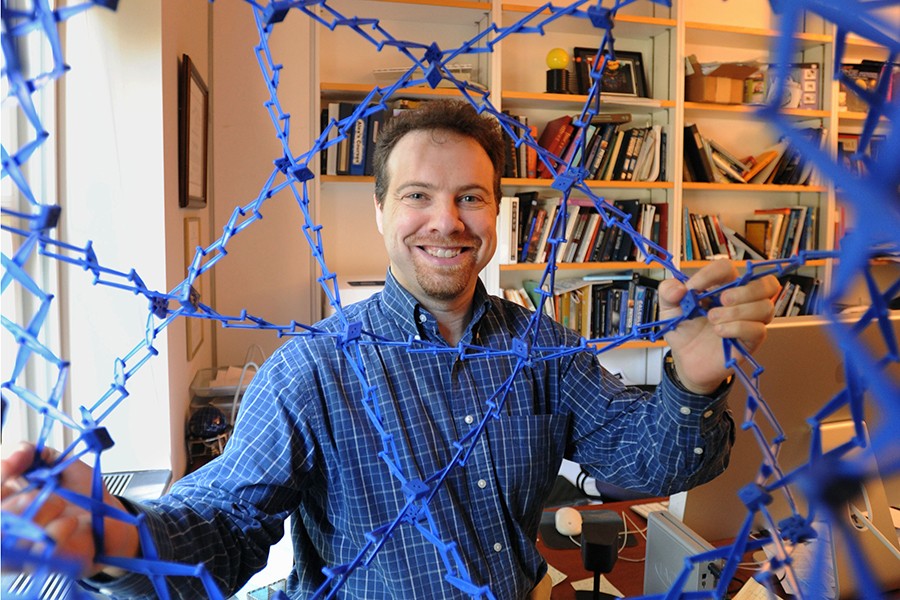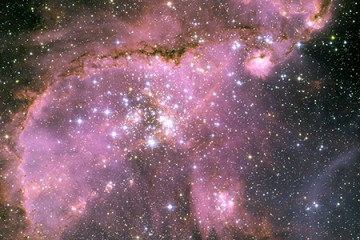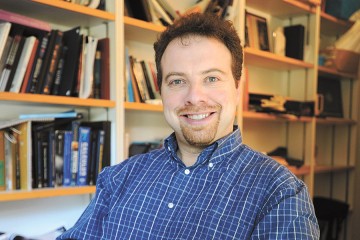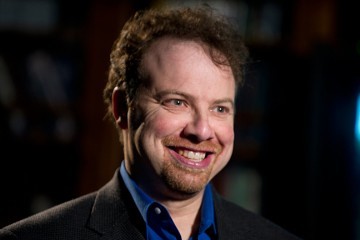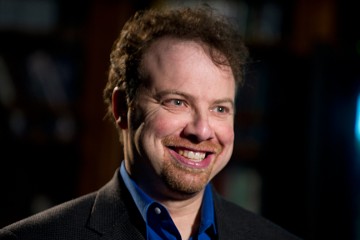Adam Riess, an internationally renowned observational cosmologist working on the measurement of the expansion of the universe and a recipient of the 2011 Nobel Prize in physics, has been named a Bloomberg Distinguished Professor at Johns Hopkins University.
He is the 22nd Bloomberg Distinguished Professor appointed across the university and the seventh faculty member selected from within the Johns Hopkins community to join this cohort of interdisciplinary scholars.
Riess—currently the Thomas J. Barber Professor in Space Studies in the Department of Physics and Astronomy and a distinguished astronomer at the Space Telescope Science Institute—will be jointly appointed in the Department of Earth and Planetary Sciences at JHU's Krieger School of Arts and Sciences.
"Adam is a forward-thinking leader and highly talented educator who exemplifies the mission of this great institution through hands-on teaching and the truly international scope of his research," says Robert C. Lieberman, provost and senior vice president for academic affairs at Johns Hopkins. "We are thrilled to recognize this esteemed member of the Johns Hopkins faculty with a Bloomberg Distinguished Professorship."
The professorships are supported by a $350 million gift to the university by Johns Hopkins alumnus, philanthropist, and three-term New York City Mayor Michael R. Bloomberg. The majority of this gift is dedicated to creating 50 new interdisciplinary professorships, galvanizing people, resources, research, and educational opportunities to address major world problems.
Riess won the 2011 Nobel Prize in physics—an honor he shared with Saul Perlmutter and Brian Schmidt—for his team's discovery that the expansion rate of the universe is accelerating, a phenomenon widely attributed to a mysterious, unexplained dark energy filling the universe. A form of dark energy was originally predicted by Einstein's General Theory of Relativity.
He currently uses NASA's Hubble Space Telescope to continue his measurements of distant supernovae, and to provide important independent probes of the nature of dark energy through very precise measurements of the present rate of expansion of the universe. His goal is to determine the behavior of dark energy, and to see if it has been changing with time. Such measurements are crucial to understand the remarkable physics that underlies dark energy.
He recently led a study that found the universe appears to be expanding faster now than predicted by measurements of the rate as seen shortly after the Big Bang, Riess said the results compiled using the Hubble Space Telescope could shed light on the composition of the universe and raise questions about Einstein's theory of gravity.
"In my work I have found what Yogi Berra said to be especially true—'you can observe a lot just by watching'—and my observations have been aided by powerful telescopes and remarkable collaborators," Riess says. "With the Bloomberg Distinguished Professorship, I look forward to building upon these collaborations in new areas of exploration."
Riess uses numerous astronomical phenomena to map the universe in order to understand its expansion. This is a critically important aspect of furthering our knowledge of the origin and ultimate destiny of our universe, and to understanding the fundamental physics of space and time. Through his measurements of the cosmological framework, his work spans multiple fields, utilizing tools of astronomy and remote sensing with applications in physics, statistics, and math.
Video credit: Loyola University Maryland
Recently, Riess has been developing new tools for measuring high precision astrometry with telescopes. These tools can be used to improve parallax measurements for cosmology as well as for finding exoplanets around other stars by observing the apparent motion of host stars, which has provided the basis of recent proposals with the Hubble Space Telescope. With this new application in the field of extra-solar planets, Riess will actively advise the Department of Earth and Planetary Sciences on how best to promote and develop this burgeoning field.
"Understanding the nature of dark energy is widely regarded as the most important unsolved problem in all of physics," says Beverly Wendland, the James B. Knapp Dean of the Krieger School of Arts and Sciences. "Not only is Adam pioneering these investigations, but he is also an exceptional teacher and mentor, inspiring the next generation of astronomers and physicists to probe such monumental questions. We are thrilled he continues to make Johns Hopkins his academic home and look forward to the novel collaborations that follow this esteemed appointment."
Since 2007, Riess has taught the highly popular undergraduate course Stars and the Universe: Cosmic Evolution. An introduction to astronomy that is open to all majors, students learn about key discoveries in astronomy and astrophysics that have shaped our current understanding of the universe. The class incorporates insights from physics, astronomy, geology, chemistry, biology, and anthropology, and has seen enrollment double three times.
In addition to the Nobel Prize, Riess has been awarded the Albert Einstein Medal, Shaw Prize in Astronomy, NASA Exceptional Scientific Achievement Award, Breakthrough Prize in Fundamental Physics, Gruber Prize in Cosmology, Raymond and Beverly Sackler Prize, and Helen B. Warner Prize, among others. He was also named a MacArthur Fellow in 2008 and elected to both the National Academy of Sciences and the American Academy of Arts & Sciences.
Riess received a bachelor of science degree in physics from the Massachusetts Institute of Technology in 1992, and master's and doctoral degrees in astrophysics from Harvard in 1994 and 1996, respectively. He was then awarded the prestigious Miller Fellowship, which he held at the University of California, Berkeley, from 1996 through 1999. It was during this period that his first seminal paper on the discovery of an accelerating universe was published.
Riess joined the Space Telescope Science Institute as a distinguished astronomer, and in 2006 was jointly appointed in the Johns Hopkins Department of Physics and Astronomy. He became the Thomas J. Barber Professor in 2012.
Posted in Science+Technology
Tagged adam riess, astrophysics, bloomberg distinguished professorships




